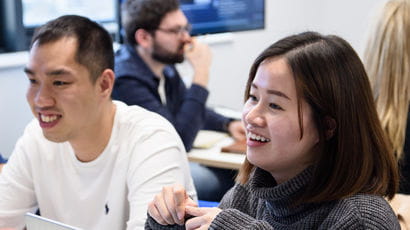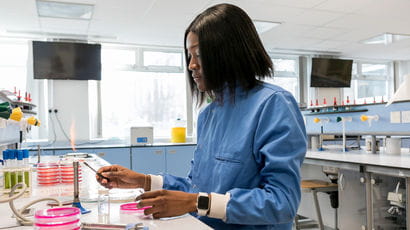Investigating biofilm infection processes; rapid diagnostics through exploitation of graphene-based sensor technology
Introduction
An opportunity to apply for a funded full-time PhD in the Faculty of Health and Applied Sciences, UWE Bristol. The studentship will be funded by the UWE partnership PhD scheme in collaboration with Altered Carbon Ltd.
The expected start date of this studentship is October 2022.
The closing date for applications is 27 June 2022.
Studentship details
This Partnership PhD brings together a leading-edge graphene technology company, Altered Carbon, the Bristol-based NHS Burn’s research centre (Dr Amber Young) and UWE Bristol (Associate Professor Robin Thorn and Professor Darren Reynolds), to address current and future ‘health and wellbeing’ global challenges related to biofilm infection processes. The PhD student will be based within the UWE Centre for Research in Biosciences microbiology research facility. They will also benefit from spending one month a year working within Altered Carbon facilities (located in Bristol), to gain hands-on practical experience of developing ‘smart sensors’ based on graphene technology applications.
Background
Our previous research has shown that it is possible to differentiate microorganisms by volatile compound profiling. However, there is an urgent need to develop this diagnostic approach into point of use diagnostic devices for a range of health, Agri-tech and environmental applications within the field of microbial biofilm research. This capability now exists through use of emerging graphene sensor technology developed by Altered Carbon; a producer of innovative graphene-based array gas sensors for a variety of Internet of Things (IoT) applications, including health biomarkers (exhaled breath), air quality and fresh produce monitoring. Currently, Altered Carbon are the only supplier of a commercially viable graphene-based array sensor on the world's market that can detect gases/vapours from different environments. Altered Carbon will provide commercial context and support, enabling significant opportunities to the PhD student, while also ensuring the outcomes remain focussed on real-world application, leading to tangible outcomes and industrial impact.
Study overview
The main aim of this PhD is to develop representative biofilm models within the field of health, agri-food and the environment, exploiting these to enable the co-development (with industry) of proof-of-concept devices to detect, identify and quantify microbial volatiles associated with biofilm infection processes. This will involve optimisation of bespoke static and perfusion biofilms systems, including use of advanced imaging (electron and confocal microscopy) and mass spectrometry (selective-ion flow-tube mass spectrometry) techniques. The proposed diagnostic approach is based on graphene sensors which can be designed and fabricated to selectively bind target gases of interest, enabling a novel approach to biofilm diagnostics. There are no diagnostic approaches to detect biofilms facilitating rapid diagnosis of infection events, therefore a solutions-based approach will advance knowledge in both fundamental science (microbial metabolomics) and applied research (diagnostics) capable of real-world impact. This successful candidate will create new microbiological and technological knowledge through development of new biofilm models and prototype diagnostic technology platforms, consolidating an existing local collaboration leading to future external funding opportunities.
This collaborative project demonstrates ambition, innovation and enterprise in addressing a real-world problem with an ultimate aim to demonstrate significant health gain, helping to shape the health and sustainability of future communities.
For an informal discussion about the studentship, please email Dr Robin Thorn at robin2.thorn@uwe.ac.uk
Funding
The studentship is available from the Faculty of Health and Applied Sciences from October 2022 for a period of three years, subject to satisfactory progress and includes a tax exempt stipend, which is currently £16,602 per annum.
In addition, full-time tuition fees will be covered for up to three years (Home/EU rates only).
Please note: Overseas applicants will be required to cover the difference between Home/EU and the overseas tuition fee rates in each year of study.
Eligibility
Applicants must have a BSc (2:1 or above) or equivalent degree in a biological or biomedical sciences discipline, including but not limited to Microbiology, Cell Biology, Molecular Biology and Biotechnology. Ideally applicants would have an MSc, but this is not essential. The studentship is available both for UK and overseas applicants, but funding is only offered for UK fees.
Experience of the following is desirable, but not essential to the role as training will be provided within the PhD programme:
- Biofilm modelling (either static or perfusion systems)
- Metabolomics or volatile compound detection
- Statistical modelling or programming (e.g. RStudio or MATLAB)
How to apply
Please submit your application online. When prompted, use the reference number 2022-OCT-HAS07.
Supporting documentation: you will need to upload your research proposal, all your degree certificates and transcripts and your proof of English language proficiency as attachments to your application so please have these available when you complete the application form.
References: you will need to provide details of two referees as part of your application. At least one referee must be an academic referee from the institution that conferred your highest degree. Your referee will be asked for a reference at the time you submit your application, so please ensure that your nominated referees are willing and able to provide references within 14 days of your application being submitted.
Closing Date
The closing date for applications is 27 June 2022.
Further information
Interviews will take place in August. If you have not heard from us by 31 July 2022, we thank you for your application but on this occasion you have not been successful.
You may also be interested in

Contact the Doctoral Academy
Ways to contact the Doctoral Academy, from postgraduate research support to submitting your thesis.

Fees and funding
View Doctoral Academy tuition fees, project fees, completion fees and resubmission fees.

About the Doctoral Academy
Find out more about the UWE Bristol Doctoral Academy.

Research
Discover how research at UWE Bristol is making a real impact.
